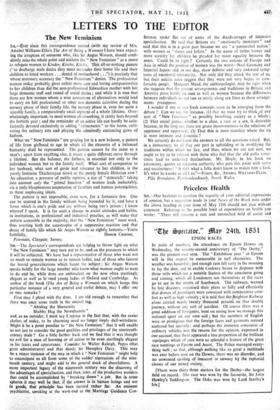LETTERS TO THE EDITOR
The New Feminism
Sia,—Ever since this correspondence started (with my review of Mrs.
Amabel Williams-Ellis's The Art of Being a Woman) I have been expect- ing the irruption of someone who, like Sir Angus Watson, should confi- dently miss the whole point and acclaim the" New Feminism" as a move to relegate women to Kinder, Kirche, Kiiche. This all-or-nothing picture ("to discharge male duties they must surrender their home life and their children to hired workers ... denial of motherhood ...") is precisely that whose necessary accuracy the "New Feminism" denies. The professional woman today probably gives rather more care and loving companionship to her children than did the non-professional Edwardian mother with her large domestic staff and round of social duties ; and while it is true that there are few women whom a wise assessment of alternatives would lead to carry on full professional or other non-domestic activities during the nursery phase of their family life, the nursery phase is, even for quite a sizeable family, a comparatively small segment of a whole lifetime. Over- whelmingly important, to most women all-absorbing, it rarely lasts beyond the fortieth year ; and the remainder of an active life can hardly be satis- factorily devoted exclusively to adding "refinements" to the home, culti- vating the culinary arts and playing the admittedly entrancing game of fashion.
What we "New Feminists" are groping for is a new balance, a pattern of life from girlhood. to age in which all the elements of a balanced humanity shall be represented. The pattern cannot be the same as a man's ; apart from anything else, it traces a quite different curve through a lifetime. N.13,ut the balance, the fullness, is essential not only to the individual woman but to the family itself. What sort of companion to her husband, what sort of guide and educator to her children, is the purely feminine Thackerayan nitwit or the purely female Hitlerian cow ? An education, a pressure of public opinion, a use of "statecraft," taking into account only the "primal function" of women leads ineluctably, via a truly blasphemous amputation of faculties and human potentialities, to these unpleasing ideals.
The pattern is not impossible, even now, for a fortunate few. One can be centred in the family without being bounded by it, and have a home which is one's pride and joy without being one's prison ; I know whereof I speak. It is for such a change in. social attitudes and habits, in institutions, in professional and industrial practice, as will make that pattern accessible to the majority, that the "New Feminism" must work, thus averting both the catastrophe of a suppressive reaction and that decay of family life which Sir Angus Watson so rightly laments.—Yours


































 Previous page
Previous page